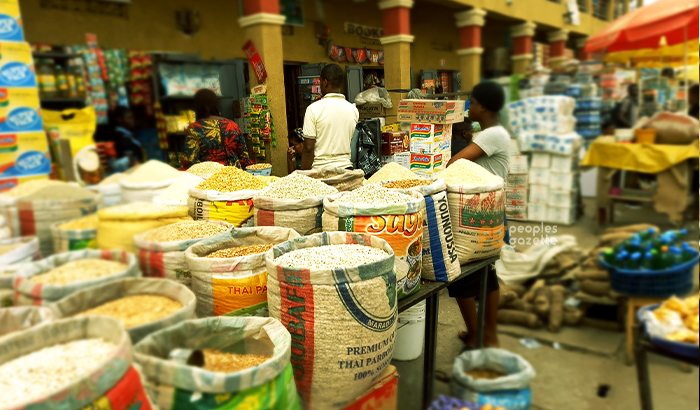Nigeria’s food inflation would likely reach record high this July based on the current increase in prices of basic food items by traders in different states of the country.
Following the increase in the price of Premium Motor Spirit on May 31, 2023 to more than N537 per litre, and again on July 18, 2023 to more than N617 per litre in Abuja and its envisions and even higher prices in the northern states, analysts expect the food inflation figures to escalate.
According to data released by the Nigerian Bureau of Statistics last week, in the month of June, food inflation rose by 2.40 percent from the month of May and by 25.25 per cent on a year-on-year basis.
The 25.25 percent, it said, was 4.65 percent higher relative to the rate recorded in June 2022 (20.60 percent).
The rise in food inflation, according to NBS data, was based on increases in prices of oil and fat, bread and cereals, fish, potatoes, yam and other tubers, fruits, meat, vegetable, Milk, cheese and eggs.
But a survey by LEADERSHIP Sunday on the prices of rice, beans and bread since May 29, suggests a likelihood that food inflation may be much higher in the month of July. The NBS is expected to release data on food inflation on August 15, 2023.
But traders in markets are already blaming the increase in the price of petrol for the rising cost of basic foodstuff while many appear indifferent to the recent declaration of an emergency on food security by the government of Bola Tinubu.
The sharp increase in the prices of PMS necessitated by the removal of subsidy by President Tinubu has resulted in an upsurge in the cost of foodstuff such as rice, beans and ground corn in Yobe.
A survey by LEADERSHIP Sunday in Damaturu, the Yobe State capital, showed that a mudu of locally produced rice that was hitherto sold at the cost of N1,700 before the announcement of the subsidy removal now costs between N2,000 and 2,200 depending on the quality.
Similarly, a mudu of beans that was sold at the cost of N800 to N900 now costs N1,400 though the prices vary from one area to the other depending on the location.
A foodstuff seller in Damaturu, Usman Mohammed said, “You see, here in Yobe State as it is the case in other parts of the country as we are hearing, the situation is deteriorating on a daily basis because as we were battling to come out of the shackles of naira redesign which created untold hardship, this subsidy removal then set in.
“Apart from the increase in the prices of rice and beans, a mudu of ground corn that was hitherto sold at the cost of N650 now is sold at the cost of N1,400 to N1,500 and goes like this for other products.”
Another trader, Abubakar Babangida affirmed the increase adding that for the first time, a 50kg of refined sugar now cost over N40,000 in Damaturu.
“Also, there is an increase in the prices of bags of flour though, a loaf of bread that was sold at the cost of N330 is still being sold at the same price and in some areas N350 depending on the location.”
They called on both the federal and state governments to hasten the intervention measures for optimum control of inflation, among others.
In Benue State, a market survey to ascertain the price of some food items by our correspondent indicates that the price of beans and rice have skyrocketed to an unprecedented level although the prices of these items vary. For example, at the Wurukum Market, Makurdi, it was observed that a mudu of local stone-free rice goes for N1,200 while the one with stones is sold at N900 or N1,000 depending on the type and how clean it is as against between N600 and N800 before May 29, 2023.
In the same market, some traders were selling foreign rice at the price of N1,300, N1,400 and even N1,500. When our correspondent sought to know the reason for the variation, a trader who simply identified himself as Chinedu said the rice are not the same type and their wholesale prices also differ that is why the product is being sold at different prices. So, it is left for the customer to make their choices.
“Before now, a mudu of foreign rice was sold at N1,000, N900 and N800 depending on the type a customer wants to buy, but due to transport and other expenses, the price has increased tremendously.
However, at Modern Market, the price of stone-free mudu of local rice is N1,100, while a mudu of local rice with stones popularly called ‘o mu God’ goes for N1,000 and N900 depending on the type a customer is buying, while foreign rice goes for a flat price of N1,200.
For Alhaji Adamu Mai gari who sells grains at Modern Market, the price of a mudu of beans depends on the type a customer wants to buy. According to him there are many types of beans ranging from, Adamawa Beans which a mudu goes for N900; Iron Beans, N900 while a mudu of red beans is N1,000. He added that there are other beans like Aloka among others and the prices are between N700 and N800.
He said, “before now, we were selling a mudu of Adamawa Beans between N650 and N700; same thing with Iron Beans while the red beans were sold for N750 and N800, but due to transport and other expenses, following the hike in the price of Premium Motor Spirit (PMS), we don’t have a choice than to increase the price to make little gains.
Also, visits to some of the bread-producing factories in Makurdi metropolis showed that a good loaf of bread, which before May 29 was sold between N600 and 700 is now sold at N800, N900 or N1,000 and the size, quantity and quality are no longer the same; there is a sharp drop in the quantity and size of the bread.
Our correspondent observed that the increase in the price of a loaf of bread has also given room for the production of low-quality bread that is not quite healthy for consumption.
Prior to May 29, 2023, prices of small beans per mudu goes for N700 while the big beans go for N750, however after May 29 and the subsequent removal of fuel subsidy, prices jumped up and as it stands today, small beans per mudu goes for N850 while the big ones known as Iron beans now goes for between N900 and N950 and in some cases, depending on its cleanness, it could sell for N1000 per mudu.
For rice, the prices depend on whether it is foreign or local variety. For local rice, before May 29, it was sold for N500 per mudu while the foreign parboiled rice was sold for N800 but after the subsidy removal, local rice per mudu now sells for between N900 and N1,000 depending on how clean it is while the parboiled foreign rice, though banned but always finds its way into the market, sells for N1,200 per mudu.
The increase is also being experienced in the prices of loaves of bread depending on the size. Small size of bread that used to sell for N200 now goes for between N350 and N400 and the big size that was hitherto sold for N500 jumped to N800 and now sells for N900 while the same sells for as much as N1,000 in super markets.
The increase of prices of food items has also led to an increase in prices of cooked food in most restaurants across the state. A plate of rice that went for N400 now sells for N700 while a combination of rice and beans that used to sell for N600 now goes for N800 after fuel subsidy removal.
Similarly, following the increase in the price of fuel which concomitantly affected transportation fares, the prices of essential foodstuffs such as bread, rice and beans have risen in Gombe State.
A trader at Yerima Quarters in the state capital, Malam Hassan explained that a small loaf of bread that was sold at N350 before subsidy removal is now sold at N400 while a big loaf previously sold at N450 is now N500.
He added that one mudu (measure) of local rice which was N750 recently, has risen to N950 while a measure of foreign rice sold at N1,100 before has risen to N1,300.
Buyers of the foodstuffs have continued to lament the situation, asking government to enforce price control on essential commodities after removing the fuel subsidy.
Others opined that the palliative proposed by the federal government would not remedy the situation if prices of commodities are not controlled fearing that they would keep skyrocketing.
Also, mild increase in price of food commodities in Lokoja, the Kogi State capital has been noticed as traders in major markets are blaming the increase in price of foodstuff on the removal of fuel subsidy.
LEADERSHIP Sunday visited the popular International Market where the price of food items has witnessed about 10 percent increase.
A mudu of rice that used to sell for N1,200 before the announcement of the subsidy removal now sells for N1,300 while a mudu of beans that was sold for N700 now goes for N800.
At some confectionery outlets where breads and pastries are sold, items like bread made of wheat and buttered bread have experienced an increase in price. A super loaf that was sold for N700 now sells for N1,000 while the jumbo loaf that sells for N900 now goes for N1,200.
In Ebonyi, though the state remains one of the rice producing states in the country, the price of rice has increased since May 29, 2023 following the hike in the cost of transportation from the rural communities and other Northern states where the rice paddy is gotten from.
A visit to the Ebonyi Rice Milling Company, Abakaliki, shows that before May 29, 2023, 25kg of rice (100 cups) was sold at N11,000. It later increased to between N14,00 and N14,800 but surprisingly, with the recent increase in fuel pump rice, 25kg is now sold between N17,000 and N19,000.
The 50kg of Abakaliki rice which is about 200 cups which was previously sold at N21,000 is now sold at N25,000.
At the Abakaliki International Market and the Kpirikpiri Market in Abakaliki, LEADERSHIP Sunday observed that a cup of rice which was before now sold at N130 before May 29 is now sold at N170.
Some of the traders attributed the high cost and increase in the price to the cost of transportation from the rural communities where they purchase the rice from.
The story is the same in Jigawa State. “One mudu of small beans was sold at N600 before, but it is now sold at N700. The larger beans was N650 per mudu before but it is now N800,” a grain seller, Mallam Abubakar Abdullahi stated.
According to a tea seller (Maishayi), Malam Shuaibu Galadanci, the price of bread started soaring since February last year as a result of Russian/Ukraine War which affected the wheat price in the global market and the persistence inflation in Nigeria especially during the naira redesign policy/ scarcity and after the fuel subsidy removal.
“The removal of fuel subsidy has also added salt to the injury in the fragile bread market which is always determined by the price of flour, sugar, fuel and other raw materials,” he said.
“The price of one loaf of Bread in Jigawa State ranged from NN100, N200, N500 to N1,000 but the price of each loaf has increased by over 100 percent each while the size has also reduced,” Shuaibu said.





